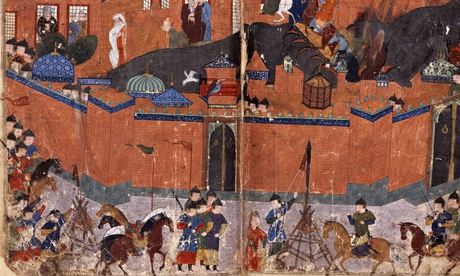- Was the flowering of liberal Arab youth an illusion? Juan Cole, a prominent liberal blogger and scholar of the Middle East, thinks not. In The New Arabs, he argues that the upheavals of 2011 were the product of a new generation of activists that has already wrought deep social changes, and is likely—eventually—to reshape much of the Middle East in its own image: more democratic, more tolerant, and more secular.
Monday, September 22, 2014
Canaries or Red Herrings?
Though reviewer Worth is more pessimistic, I'll plump for it as reality for now:
Thursday, June 12, 2014
Mosul & the Lessons of History: Perhaps
 Mosul seized by a small group proclaiming a Sunni pan-state across Syria and Iraq. And now Kurds claiming back Kirkuk from the Arabisation that Saddam Hussein instituted on that northern Iraqi city ("Iraqi Kurds 'fully control Kirkuk' as army flees," by Paul Wood, BBC News, 12 June 2014). "The Fall of Mosul and the False Promises of Modern History," by Juan Cole, History News Network, 11 June 2014, lays blame for recent events on, well, just about everyone. "Hold Your Horses, Iraq Is Not About to Fall … Yet," by Douglas Ollivant, Foreign Policy, June 12, 2014, is not unwilling to apportion blame for the "known-unknowns." But what has happened is not yet clear, so perhaps assigning the lessons of why it happened might be a bit premature.
Mosul seized by a small group proclaiming a Sunni pan-state across Syria and Iraq. And now Kurds claiming back Kirkuk from the Arabisation that Saddam Hussein instituted on that northern Iraqi city ("Iraqi Kurds 'fully control Kirkuk' as army flees," by Paul Wood, BBC News, 12 June 2014). "The Fall of Mosul and the False Promises of Modern History," by Juan Cole, History News Network, 11 June 2014, lays blame for recent events on, well, just about everyone. "Hold Your Horses, Iraq Is Not About to Fall … Yet," by Douglas Ollivant, Foreign Policy, June 12, 2014, is not unwilling to apportion blame for the "known-unknowns." But what has happened is not yet clear, so perhaps assigning the lessons of why it happened might be a bit premature. A slightly longer timescale for Iraqi cities is provided in "Baghdad by Justin Marozzi – review," by Christopher de Bellaigue, The Guardian, 11 June 2014, which reviews a new book beginning when "the city was founded by the Abbasid caliph Mansur in 762," and including (left) when the Mongols were at the gates in 1258.
A slightly longer timescale for Iraqi cities is provided in "Baghdad by Justin Marozzi – review," by Christopher de Bellaigue, The Guardian, 11 June 2014, which reviews a new book beginning when "the city was founded by the Abbasid caliph Mansur in 762," and including (left) when the Mongols were at the gates in 1258.
Tuesday, June 10, 2014
Contextualizing Arab Spring - Now
"Confronting Amnesia and Political Change in the Arab World," by Martin Evans, History Today, Blog, 10 June 2014, highlights a new movie, They Are the Dogs, which appears to be about a worker released from prison for something that did or did not happen in the 1980s right at the time that Morocco is spiraling into crisis. (The article includes a trailer in English.) Morocco didn't have a "Spring," but the atmosphere on the streets is similar to that in Egypt or Tunisia.
- "The film follows three members of a television crew as they set off to report on the protest movements in Morocco in February 2011. Intrigued by the strange mannerisms of an old man called Majhoul, the crew decide to focus their report on him. As they follow him through the backstreets of urban Casablanca, the crew discover the story of a man who has just been released from prison 30 years after a police raid during Morocco's 1981 food riots, and who is completely lost in a modern Morocco in the midst of the Arab Spring."
Wednesday, June 04, 2014
Iran: Another Year, another Spring
"Tehran Postcard: What Has Rouhani Changed In One Year?," by Claudio Gallo, Worldcrunch, 3 June 2014 (originally La Stampa, 27 May 2014)
- "'The atmosphere here has gotten better,' says Nima. 'The morality police aren’t harassing us so much anymore, and the tourists have come back. But we’re from Isfahan, in the center of the country, and everything there is still closed.'"
Friday, May 09, 2014
"What do we have to do with a revolution?"
Egypt's Tourism Crash Gives Way To Bustling Opium Trade - http://www.worldcrunch.com/culture-society/egypt-039-s-tourism-crash-gives-way-to-bustling-opium-trade/opium-farming-tourism-egyptian-revolution/c3s15827/?utm_medium=referral&utm_source=pulsenews#.U2zLn8oo7qA
Monday, April 28, 2014
Farouk or Nasser?
 Richard Cavendish remembers
Richard Cavendish remembers Tuesday, April 15, 2014
Varieties of Revolution
"What is the Egyptian anti-coup movement protesting for?," by Neil Ketchley and Michael Biggs, Washington Post (April 4, 2014) analyzes polling data from protestors. Meanwhile, the protests, the mass trials (and incarcerations) continue.
Springs Eternal?
 |
| Barakat (Enough) anti-vote Algerians |
Thursday, April 03, 2014
Tuesday, March 25, 2014
Subscribe to:
Comments (Atom)